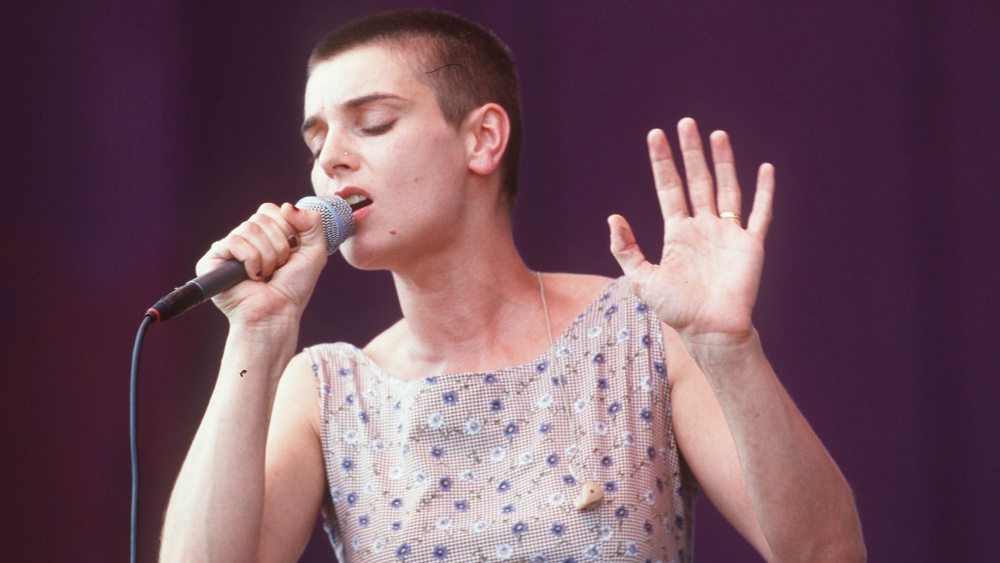
When David Bowie died in 2016, panicked broadcasters ripped up their schedules and clambered to assemble heartfelt tributes to the “Space Oddity” singer. Later that year, when George Michael succumbed to heart failure on Christmas Day, BBC Four dedicated an entire night of programming to him — no easy feat around the holidays, when pre-commissioned programs are revealed months in advance in a race for ratings.
Sinéad O’Connor’s death at 56 shocked the world on Wednesday, and was on the front page of virtually every paper in the U.K. the next morning. In an interview with Variety on Friday, Kathryn Ferguson, who directed the 2022 documentary “Nothing Compares” about O’Connor, described Ireland as “a country in mourning,” with extensive media coverage of the outspoken musician.
But on the U.K.’s main broadcasters, you won’t see meaningful remembrances of the Irish singer anytime soon. Variety has confirmed that BBC, ITV and Channel 5 don’t currently plan to air any specially packaged specials or tributes on their channels going into the weekend. Perhaps most surprising is Channel 4, Britain’s supposedly disruptive broadcaster, which has also come up empty. What’s airing there at 8 p.m. on Friday night? “The Secret World of Biscuits.”
“The simple explanation is that she was underrated and not taken seriously,” says Steven D. Wright, a TV commentator and former Channel 4 commissioner. “Only now are people saying, ‘Hang on, she was kind of an iconoclast for having spoken out against the Catholic Church when she did.’ There’s the one documentary [‘Nothing Compares’] that’s coming out, but that’s coincidental. There was someone who realized this was a woman who needed proper analysis and a retrospective. Everyone else looked the other way.”
Wright highlights that music “doesn’t get taken seriously on TV” in Britain in the way that it used to. “Pop culture used to be really important in the ‘90s, but it’s not [valued] as much by the broadcasters anymore,” he adds. As such, in practical terms, there’s likely a lack of thoughtful material on figures such as O’Connor.
“I think there will be some pieces coming out, but that’s why there hasn’t been that ‘Top of the Pops’ special we used to see,” Wright says.
On the BBC’s part, the heavy lifting following O’Connor’s death seems to have fallen squarely on the shoulders of its radio teams across the country. BBC Sounds has resurfaced an interview with O’Connor, and her songs have been played on BBC stations such as Radio 2 and 6 Music.
Over on Channel 5 — the same broadcaster that spat out a special on the doomed Titanic submersible just four days after the vessel went missing — there’s nothing planned. Meanwhile, the Paramount Global-owned broadcaster’s sister channel MTV is serving up little more than “Sinead O’Connor: A Tribute” music blocks on its MTV 90s channel. (These “blocks” are little more than a couple of O’Connor’s music videos broadcast against a crawl.)
Gay Byrne kisses Sinéad O’Connor on the final episode of Ireland’s “The Late Late Show” in 1999.
Are national politics at play here? Bowie and George Michael were both London-born stars. In comparison, the Dublin-born O’Connor is from the Republic of Ireland, which, unlike Northern Ireland, isn’t part of the United Kingdom. But one has to wonder whether the death of someone like U2 frontman Bono, a fellow Dubliner, would evoke the same nonchalance in the broadcast realm. While O’Connor did not reach the same level of commercial success as these artists, her cultural imprint in Ireland and the U.K. is just as significant.
In Ireland — where O’Connor’s protest against the Catholic Church’s abuses on “Saturday Night Live” is mostly in the distant past — the singer’s death is getting more attention by the likes of public broadcaster RTÉ.
A spokesperson for the channel told Variety that it will pay tribute to O’Connor with radio programs and a curated online archive of her performances and interviews, including two with “The Late Late Show’s” Gay Byrne, the late Irish talk show host who interviewed O’Connor over the years about her religious upbringing and spiritual beliefs. The Saturday night variety show “Up for the Match” is also expected to honor the singer.
RTÉ’s main piece of programming will be a Saturday night broadcast of “Sinéad O’Connor – Live at Vicar Street” on RTÉ One and RTÉ Player. The concert took place in 2002 and saw O’Connor and her band performing songs such as “Molly Malone,” “My Lagan Love,” “Nothing Compares 2 U” and “Fire on Babylon.” It will, however, air only at 11:15 p.m. on Saturday night.
Discerning schedule-watchers may point to the fact that the main event in the U.K. and Ireland this weekend will be pay-TV operator Sky’s premiere of Ferguson’s “Nothing Compares.” The broadcast of the Emmy-nominated Sundance documentary about O’Connor has been planned for months, but will undoubtedly receive disproportionate interest given the circumstances.
Wright describes a “cynical, cannibalistic response from channels” in situations like this, in which broadcasters wait to see how a retrospective program performs before drawing up their own commissioning plans.
“A lot of people [in scheduling] will be watching to see if it’s worthy of a follow-up,” he explains. “If it makes a splash on social media, then there’s more likely to be a copycat doc, because the story can still be told, and include O’Connor’s death.”
In this instance, maybe it’s the Smiths frontman Morrissey who said it best in his blistering takedown of the O’Connor tributes pouring in from those who’d previously mocked and blackballed her: “You praise her now ONLY because it is too late. You hadn’t the guts to support her when she was alive and she was looking for you.”












